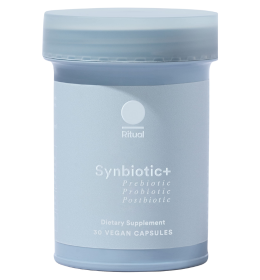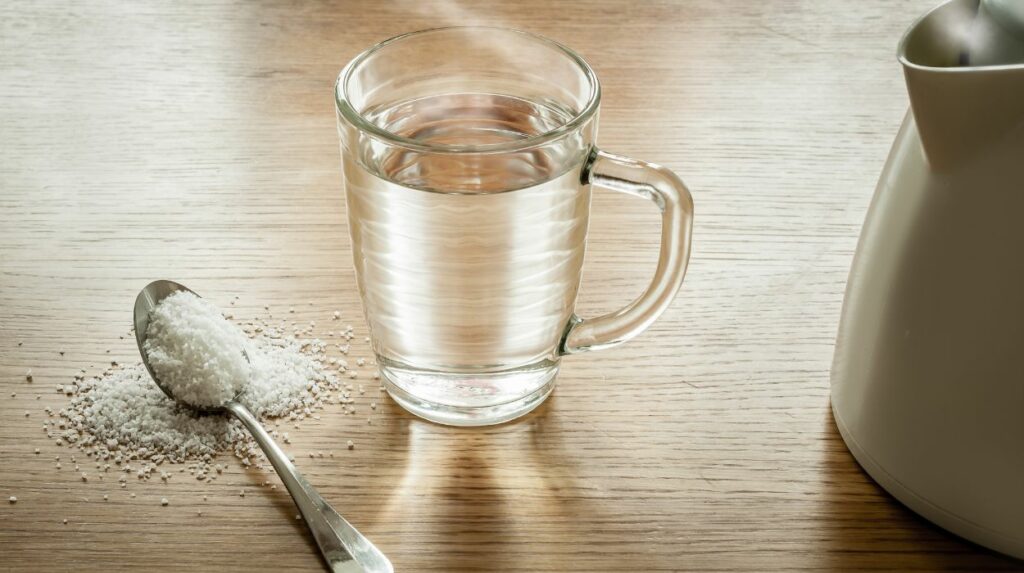
A salt water colon cleanse involves drinking a solution made with salt/sodium dissolved in water to clean out the bowels and colon. This type of cleanse may be recommended by a healthcare provider prior to procedures such as a colonoscopy.
Salt water colon cleansing may be helpful for some healthy adults when performed as instructed by a provider, but a “salt water colon flush” still requires caution, considering side effects such as dehydration and electrolyte imbalance are possible. Close monitoring of susceptible individuals, such as older adults over 60, can reduce the risk of side effects due to diarrhea and fluid loss. Salt water cleansing is generally contraindicated for those with gastric retention, kidney disease, or high blood pressure.
What Is A Salt Water Colon Cleanse?
A salt water colon cleanse involves drinking a mixture of warm water and non-iodized salt to induce a bowel movement and empty the colon. It’s used by some as an alternative to commercial colon-cleansing products, or as a “detox,” although this isn’t recommended by most experts. When performed properly, a salt water flush can relieve constipation and prepare the colon for a colonoscopy. However, side effects are possible.
What Is A Salt Water Colon Flush?
A salt water colon cleanse involves drinking a saltwater solution or taking oral sodium tablets to rapidly empty the colon. This type of colon cleanse is sometimes used as an alternative to other laxatives and bowel preps prior to colonoscopies.
Because a salt water colon helps clear the colon, it can make colonoscopies more effective. However, your provider might decide that another type of colon cleansing ingredient is safer.
Some use a saltwater colon cleanse for perceived detoxification benefits, such as reduced bloating or temporary weight loss. However, many healthcare providers recommend against[1] using this type of cleanse to “detox your body,” lose weight, or relieve ongoing constipation.
FEATURED PARTNER OFFER

Ritual Synbiotic+
- 3-in-1 formula: prebiotics, probiotics, and probiotics
- Supports a balanced gut microbiome
- Supports bloating, gas, and diarrhea
- Supports the growth of beneficial gut bacteria
- Vegan and Third-party tested
Does A Salt Water Colon Cleanse Work?
A salt water cleanse can “work” to clean out the bowels. For issues like constipation and bloating, a salt water flush will likely help temporarily, but this doesn’t mean it’s a safe remedy for digestive issues or a long-term solution.
Salt water acts as an osmotic laxative, drawing water into the colon to induce bowel movements. The salt also triggers intestinal contractions which helps to expel stool and fluids and remove gas.
However, “cleansing” the bowels too often may possibly worsen some gastrointestinal issues, possibly by altering the gut microbiota.
Types Of Salt Water Colon Cleanse Ingredients
Salt solutions can be made at home, however, if you’re working with a healthcare provider to do a colon cleanse, they will likely recommend using a sodium/salt-based colon cleanser, such as one described below:
- Sodium phosphate (NaP): NaP is taken in tablets for colonoscopy preparation and requires drinking lower volumes of liquid compared to some other sodium solutions. There are some safety concerns regarding NaP, specifically among people with an increased risk of acute kidney injury, electrolyte abnormalities, and inflammatory bowel disease. Among healthy adults under 60, NaP has been shown to be well-tolerated and effective[2] for colon cleansing.
- Oral sulfate solution (OSS): OSS is another type of salt-based prep containing sodium sulfate. One example of OSS is SuPrep. Studies show that OSS provides equal or better cleansing effects compared to PEG solutions, especially when it’s split into two doses. OSS may be better tolerated[3] by some than other bowel prep solutions. However, OSS can still cause nausea and electrolyte imbalance, so a doctor should decide if it’s safe to take.
- Polyethylene glycol (PEG): PEG, one type of which is called PLENVU®, is a bowel preparation solution that contains a combination of active ingredients, including polyethylene glycol, sodium, and electrolytes. The advantage of PEG/PLENVU® is that it’s usually taken in a 1-liter dosage, therefore a patient needs to drink less of it[4] than some other bowel prep solutions.
- Sodium picosulfate (PMC): PMC is another salt-based solution that was recently approved in the US. Clinical trials show it has comparable cleansing[5] effects to other bowel prep solutions and is usually well-tolerated and safe. Results from one study[6] showed PMC was effective for colon prep and had high patient tolerability.
Benefits Of A Salt Water Colon Cleanse

Cleansing with a salt solution can help to fully evacuate the colon and help treat constipation. Some sodium solutions may be better tolerated than other laxatives, although this depends on the individual.
Here are the main benefits and uses of a salt water colon cleanse:
- Clears the colon: A salt water cleanse uses mineral salts like magnesium sulfate or sodium phosphate to draw water into the colon, stimulating bowel movements. This clears the bowel, including before colonoscopies, which makes the colon easier to view.
- Treats constipation: A salt water colon usually results in a fast bowel movement and relief from constipation, gas, and bloating.
- Requires less fluids: Clearing the bowels with a sodium solution usually requires swallowing a low volume of fluids compared to some other preparations, which can be easier to do than other options.
How To Make A Salt Colon Cleanse
How To Make A Salt Water Flush Recipe At Home

To make a salt colon cleanse recipe at home, you’ll need unionized sea salt (not table salt) and lukewarm water.
- Stir about two to three teaspoons of iodized sea salt into 1 liter of lukewarm water until the salt is fully dissolved.
- Drink the solution on an empty stomach, ideally first thing in the morning before eating.
- Try to drink it within about five minutes.
- Stay near a bathroom for several hours so you have easy access.
How To Do A Salt Water Flush Safely
- Follow instructions: Always follow the exact instructions given by your provider, including dosage and timing instructions.
- Drink plenty of water: After having a bowel movement, drink lots of water and clear fluids to rehydrate, such as fresh juices, herbal tea, or water with fresh lemon juice and/or apple cider vinegar.
- Eat once appropriate: In terms of what to eat after a salt water flush, you can ask your provider for their advice. However, generally, it’s best to eat easy-to-digest foods that are also hydrating, such as fruits, smoothies, or yogurt.
- Don’t repeat the cleanse often: Unless your healthcare provider instructs differently, don’t perform more than one or two colon flushes per month to avoid disrupting your gut flora.
When To Do A Salt Water Flush
It’s important to listen to your healthcare provider’s instructions and advice if you want to do a saltwater colon cleanse. Avoid doing a colon cleanse solely for perceived detox benefits without medical supervision.
An appropriate time to do a salt water colon cleanse can include before a colonoscopy, as long as your provider recommends this.
Overall, there is limited research available that has determined whether salt water cleanses are appropriate or safe when used for “detoxification” purposes or for losing weight, therefore it’s best to avoid doing one unless working with a professional.
Risks And Safety
Salt water colon cleanses may be safe for some healthy adults when used correctly, but there are still some precautions to keep in mind, especially for the elderly and those with kidney issues. Overall, there isn’t enough reliable information to prove it’s safe for the general population. Salt water flushes may be especially risky for people with kidney disease, high blood pressure, or inflammatory bowel disease.
The main side effects associated with salt water colon cleanses include:
- Digestive issues like nausea and stomach pains, or in some cases, diarrhea and cramps.
- Electrolyte imbalances (such as low calcium or sodium levels) due to fluid loss and diarrhea.
- Dizziness and weakness due to dehydration.
Final Thoughts
Salt water cleanse recipes can be made with various ingredients including different types of salt/sodium. They help to flush out waste from the bowels and may be used before colonoscopies. Although some people use salt water flushes for detox purposes and weight loss, this is not recommended as side effects are possible.
Frequently Asked Questions
Does salt water cleanse your colon?
Yes, salt water colon cleanses rapidly flush the bowels using mineral salts as osmotic laxatives, often to prep for colonoscopies. Saltwater works by drawing fluids into the bowel, stimulating forceful contractions to effectively empty colon contents.
How long does it take a salt colon cleanse to work?
Salt flushes induce bowel movements typically within 30 minutes to three hours of drinking the solution.
Is a salt water flush better than a laxative?
Salt flushes fully cleanse the colon quickly, but certain types of laxatives may be gentler for some people. Salt solutions can disrupt electrolytes in some cases or cause reactions related to kidney function or blood pressure.
How long does it take to poop after salt water flush?
Most people poop between 30 minutes and three hours after a saltwater cleanse.
What are alternatives instead of using salt for a colon cleanse?
Other options include magnesium supplements, herbal laxatives, coffee enemas, or mechanical bowel prep solutions.

